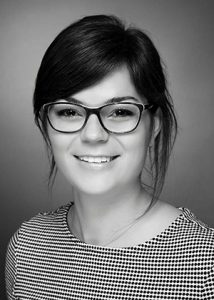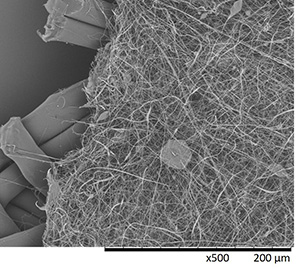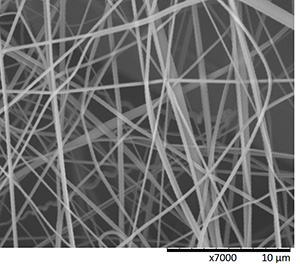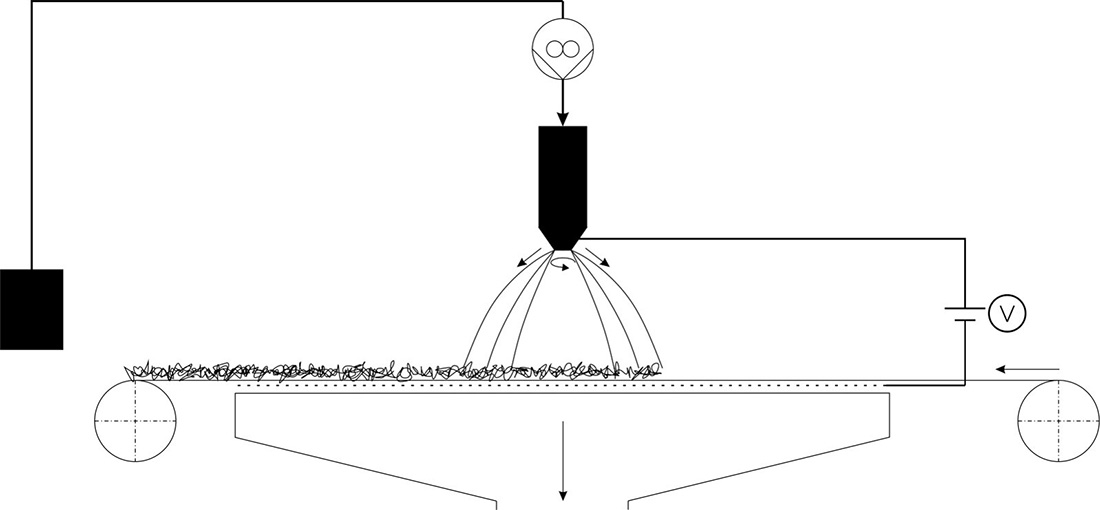
2nd Semester Master’s Degree Student, Textile Chain Research
Reutlingen University, Faculty of Textile and Design & German Institutes for Textile and Fiber Research, DITF Denkendorf Research Group
Technology Center for Finest Fiber Nonwoven Technologies
Professor/Advisor: Ing. Volker Jehle, Ph.D. & M. Sc. Simon Ringger (DITF)
Hanna Pysik is pursuing an M.Sc. in Textile Chain Research specializing in textile technology at Reutlingen University. Her semester thesis is in cooperation with the German Institutes for Textile and Fiber Research in Denkendorf (Germany) where she is conducting research on the effects of centrifugal spinning for fine fiber nonwovens.
Hanna first became interested in textiles while working with high-quality fabrics and unusual materials during her training as a men’s tailor at state theatre Stuttgart. To pursue her interest in the field, she studied textile technology (B. Eng.) at Reutlingen University, which enabled her to expand her knowledge in the areas of process engineering and innovative technical textiles. After completing her bachelor’s degree, working on the hydroentanglement of nonwovens with a focus on the potential of reducing energy, Hanna decided to pursue her master’s degree with an emphasis on nonwovens.
Research overview
For the industrial production of nonwovens in the submicrometer range, innovative spunbond processes such as meltblowing or electrospinning are key techniques. In addition to these processes, the DITF is using centrifugal spinning to study a new solution-based process to produce ultra-fine fiber nonwovens with fiber diameters between 0.1 µm and 1 µm. This method is based on the technique of high rotation spraying systems. The main component of this process is a centrifuge, which facilitates coating.
After dissolving the polymer in an appropriate solvent, a pump doses the polymer solution to the centrifuge. At high centrifugal forces by rotating the spinning head, finest solution droplets are spun-off horizontally. The centrifugal force stretches the droplet to a fiber, while the solvent evaporates. By surrounding the spinning head by a current air flow, the horizontal trajectory of the fibers is disrupted, allowing them to be collected on a carrier substrate. To support the fiber placement, an electrical field between centrifuge and collector is applied.
Basic research must optimize and establish a robust centrifugal spinning process. Also, it is important to establish a stable and competitive industrial scale for this type of fiber production. Finally, a better understanding of the potential influences of temperature and humidity on fiber morphology and nonwoven quality is needed.
Hanna’s work involves analyzing fiber and web appearance using representative microscopy images, as well as measurement of fiber diameters and the grammages in consideration of conspicuous effects during the spinning process.
To answer these questions, Hanna is conducting research to optimize the process engineering in the plant to allow the control of open variables such as humidity and temperature around the spinning head, while keeping the other machine parameters constant. The systematic evaluation of the produced nonwovens under various conditions is being assessed. Hanna’s work involves analyzing fiber and web appearance using representative microscopy images, as well as measurement of fiber diameters and the grammages in consideration of conspicuous effects during the spinning process.


First results show significant influences of temperature and relative humidity on process stability, which are reflected in the textile properties. Increasing temperatures lead to an uncontrolled fiber flight, low grammages but larger average fiber diameters. An increase in relative humidity causes less fiber flight, higher grammages, smaller average fiber diameters with an increase of nanofibers with bead morphology. These results form the basis for further investigations and may vary on the solution system being used.
Career goals
Hanna would like to continue gain expertise in nonwovens after successful completion of her master’s degree in October. Her aim is to contribute practical skills and technology knowledge within an R&D team, bringing new approaches to an industrial level. Her highest motivation is to achieve a common goal by working in collaboration across disciplines, exchanging knowledge and ideas with others.
For details on how to submit yourself or a student you know for consideration as a “Student Spotlight” in IFJ, contact Matt Migliore at mmigliore@inda.media or +1 919.459.3754.


